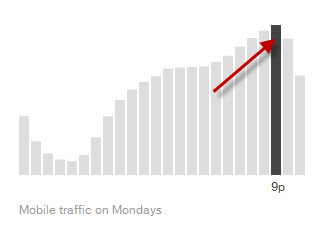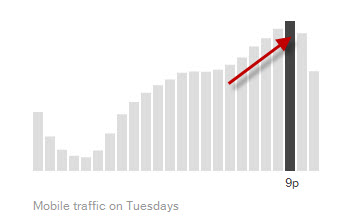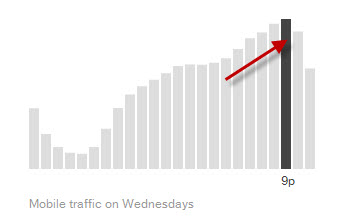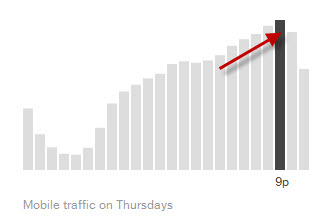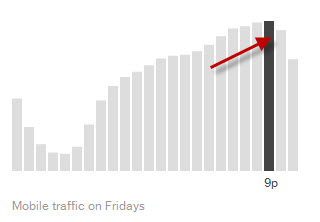Ask anyone who’s ever been on the market for a home and they’ll tell you that it feels like a second job with a crazy schedule. This is especially true today, thanks to technology. We are always hearing about workaholics who are constantly checking their email inboxes on their Android phones or the kids (and kids at heart) who can’t stop playing Angry Birds on their iPhones, but is this “always on” way of life true for house hunters?
To find out, we took a three-month snapshot of all the window shopping on Trulia.com and Trulia Mobile to see when most prospective buyers are looking at homes for sale. We then plotted our findings in a rainbow-colored chart where purple means it’s sleepy time and red means it’s a prime hour to search for homes.
Working Hard or Hardly Working?
It’s been well documented that today’s worker bees are easily sidetracked. Whether it be a fantasy football league or Facebook, the Internet offers a never-ending treasure trove of distractions. Now based on our data, we can also add drooling over real estate listings to this list.
Here’s why: After a weekend of endless open houses, most people who are trying to find their dream home are still on what you could call a “house hunting high” once Monday hits. Back at the daily grind in cubeland, many are itching to keep their search alive – as you can probably guess from the block of red from 10AM through 10 PM* on Mondays.
![]()
This “moonlighting” during the workday is especially true when you look at all the house hunting that happens from desktop and laptop computers. In pretty much every state, you’ll see an almost perfect block of red and dark orange between 9-5PM* – to see what we mean, check out Virginia and California. (By the way, in case you’re wondering, the time zones have been adjusted so that states on the East Coast are on ET while the West Coast states are on PT, and so on and so forth).
Exhibit A: Virginia, Computer Searches Only
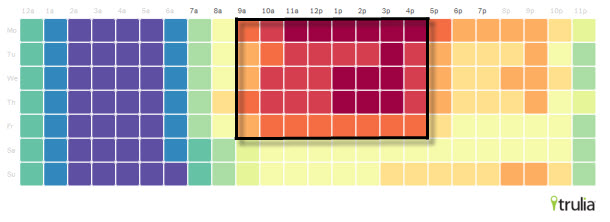
Exhibit B: California, Computer Searches Only
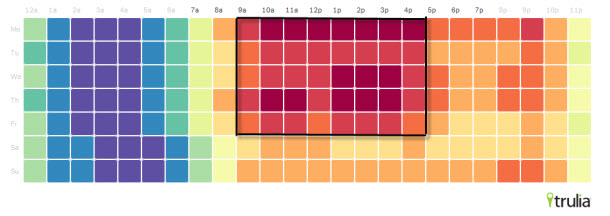
By the looks of it, employers sure have their work cut out for them when it comes to putting the smack down on “play time” during company time – good luck.
Sleepless in Seattle (along with the rest of Washington State)
As we were saying earlier, we’ve become a society that is always plugged in – via our phones, Xboxes, tablets and even our good ol’ desktops – allowing us to do more and encouraging us to get a little less shut eye. Given this, you would think that house hunters never sleep. Oh but, au contraire my friends. That assumption couldn’t be further from the truth. As a matter of fact, most do sleep – putting their search for a home on hold between 2AM and 6AM*.
Exhibit C: All States, Includes Both Computer & Mobile Searches
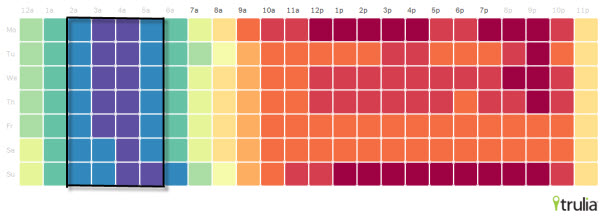
Interestingly, one group of prospective homebuyers in Washington (the state, not the capital) seems like it’s bucking this sleeping beauty trend. Whereas most states have blocks of blue, purple and maybe some green during the wee hours of the morning, computer-based house hunters in the Evergreen state show no shades of blue or purple at any hour of the day or day of the week. Keeping in mind that these state breakdowns are all relative (in other words, what’s consider high/low for each state is based just on the total web and mobile traffic coming from each state), this insight suggests that Washingtonians aren’t resting until they’ve found their dream home since the volume of house hunting on Trulia ranges from being so-so to being crazy heavy, but never light.
Exhibit D: Washington, Computer Searches Only
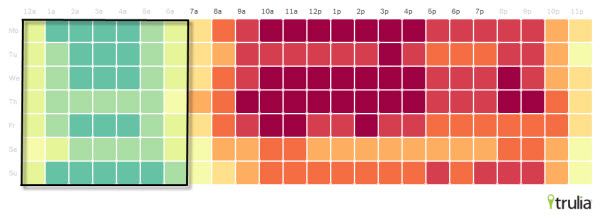
Mobile House Hunters Work Nights and Weekends
With mobile house hunting making up about 18%** of all the window shopping that happens on Trulia, we decided to take a good hard look at when these on-the-go homebuyers are searching for real estate ***.
Let’s start with the work week. When it comes to mobile house hunting, most people start checking out real estate eye candy around 4PM* with a gradual increase in the number of folks searching until it peaks at 9PM*. All in all, this isn’t too surprising given the fact that many of these house hunters are the same people looking at homes from their work computers while on the clock.
Exhibit E: Weekday Mobile Searches By Hour
More likely than not, these folks are just killing time during their daily commutes on their smartphones or decompressing after work by playing around on their iPad. On the other hand, fewer people look for homes in the mornings, but this is understandable. Most are probably trying to get in a few more ZZZs on the train (and if they’re driving, they really shouldn’t be looking at their phones) before they get in the office.
Now let’s move on over to the weekend trend. (Home sellers – listen up! This next bit of intel might be pretty useful to you especially if you’re planning to hold an open house in the near future.) What we found here is that most of these buyers are prowling for homes on Sundays, starting around 1PM until 9PM*. What this means is that they’re probably doing recon on the open houses they’re scoping out before/after their visits. So the key takeaway for sellers is to do your due diligence and make sure all the vital stats on your house can be easily found online.
Exhibit D: All States, Mobile Searches Only

So there you have it. People may be online 24/7 these days, but they’re not looking for homes at all hours of the day…just every moment they can while they’re awake.
SIDE NOTES
*In case your wondering, yes – all the time zones have been normalized for the national view and all the state views are set for their respective time zones.
** The percentage of traffic from Trulia Mobile versus Trulia.com is based on the total number of visits between June and August 2011.
***We want to be upfront about the way mobile house hunting activity is counted, so here’s the scoop. You see, depending on the carrier and the phone, cell phone service is sometimes routed through the major wireless hubs which can cause traffic to be geographically mislabeled. As a result, the mobile slice in the computer vs. mobile pie chart is a bit higher than it should be in Washington, Texas, Illinois, Georgia and Kansas. That said, we decided to keep the state-by-state breakdown in order to let folks dive deeper into the data.
